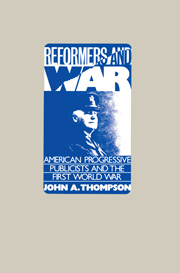2 - Progressive publicists
Published online by Cambridge University Press: 24 November 2009
Summary
In the early twentieth century, progressive publicists seemed to play an important role in politics. A number of them were national figures, their support sought by candidates for office and widely advertised when obtained. Political organizations such as the National Progressive Republican League of 1911 and the Woodrow Wilson Independent League of 1916 included men who had made their reputation primarily through writing. This situation owed much to muckraking, which had left many politicians with a healthy respect for the influence of certain well-known journalists. After the elections of 1905, Lincoln Steffens received telegrams from successful reform candidates in Ohio and Missouri thanking him for “your essential and great part in our victory.” “Can you give me a hearing?” the recently defeated presidential candidate had beseeched him a year earlier. “I am anxious to have a few minutes talk with you on a matter in which I am very much interested.” “They ‘swung the world by the tail,’” recalled one liberal editor, admiringly, of the muckrakers.
It was not all the writers of muckraking articles who acquired, or even sought, such status and influence. The phenomenon was, from one point of view, simply a journalistic vogue and in its heyday several capable reporters produced material of this type with the same facility and skill, but no more special commitment than they brought to earlier and later stories of very different character. For some of its most famous practitioners, however, muckraking was more than a routine assignment or passing fashion. Representatives of that new breed of journalists who had been to college and sometimes also to graduate school, they tended to take themselves and their work seriously.
- Type
- Chapter
- Information
- Reformers and WarAmerican Progressive Publicists and the First World War, pp. 10 - 32Publisher: Cambridge University PressPrint publication year: 1987



